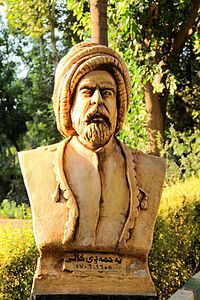Ahmad Khani
| Ahmad Khani | |
|---|---|

A bust of Ahmad Khani in Iraqi Kurdistan
|
|
| Born | 1650 Hakkari, Hakkâri Province |
| Died | 1707 (Dogubeyazit), Ağrı |
| Nationality | Kurdish |
| Occupation | Writer, poet, astronomer, philosopher |
| Years active | 17th century |
| Academic background | |
| Influences | Al-Farabi, Ferdowsi, Malaye Jaziri, Ali Hariri, Faqi Tayran |
| Academic work | |
| Influenced | Abdurrahman Sharafkandi, Mastoureh Ardalan, Nalî, Haji Qadir Koyi, Hemin Mukriyani |
Ahmad Khani, Ahmad-i Khani (Kurdish: Ehmedê Xanî, (1650 Hakkari –1707 Doğubeyazıt) was a Kurdish writer, poet, astronomer and philosopher. He was born amongst the Khani's tribe in Hakkari province in present-day Turkey. He moved to Bayezid in Ritkan province and settled there. Later he started with teaching Kurdish (Kurmanji) at basic level. Khani was fluent in Kurdish, Arabic and Persian. He wrote his Arabic-Kurdish dictionary "Nûbihara Biçûkan" (The Spring of Children) in 1683 to help children with their learning process.
His most important work is the Kurdish classic love story "Mem and Zin" (Mem û Zîn) (1692).
His other work include a book called Eqîdeya Îmanê (The Path of Faith), which is part poem and part prose. The book explains the five pillars of Islamic faith. It was published in 2000 in Sweden.
...
Wikipedia
